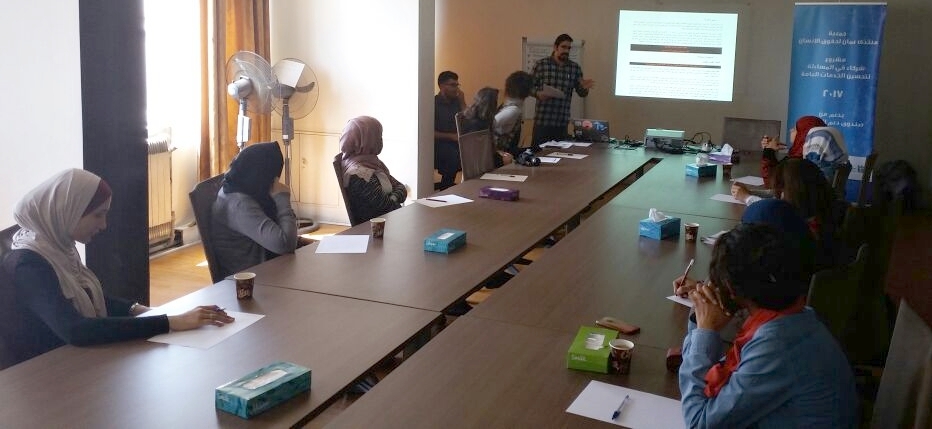Seminar of dialogue on the amending laws and the new developments in the death penalty
The Amman Center for Human Rights Studies [ACHRS] and the Jordanian Alliance Against Capital Punishment held a session of dialogue to oppose capital punishment. Several members of the Alliance, including academics, party officials, intellectuals, media workers, and human rights activists participated in the dialogue.
Chairman of the Legal Committee of the House of Representatives, Mubarak Abu-Yassin, gave a lecture on the relevant laws and other legislation submitted to the current extraordinary session of the House of Representatives. He expressed hope that this legal activity will result in the enacting of laws in line with the Jordanian citizens’ interests and continue to minimize the scope and applicability of capital punishment in Jordanian laws by freezing these laws at the present time and perhaps revoking them for good on a later date.
Abu-Yassin explained that the House of Representatives will consider ammending the legal articles contained in Penal Code Number 16 of 1960 and revoke the death penalty from its provisions, particularly Article 120 which states that whoever recruits people in Jordan, without the approval of the government, to work for a foreign country can be punished by temporary arrest, and if the foreign country is an enemy country, the death penalty applies.
The death penalty would also be revoked from Article 142 which imposes capital punishment or life imprisonment with hard labor for those who commit assaults aimed at sparking civil war or sectarian fighting, those who arm Jordanian citizens or cause them to be armed in order to fight one against one another, and those who instigate them to kill one another and loot commercial stores.
The death penalty would also be revoked from Article 372 which states that if an act of arson results in the death of any person, the death penalty shall be applied against the arsonist in the cases stipulated in Articles 368 and 369, and life imprisonment at hard labor in the cases stipulated in Articles 370 and 371.
In remarks to the seminar, Islamic intellectual Dr. Hamdi Murad spoke about the status of the death penalty in the Islamic Shari’ah. He said that the Islamic Shari’ah has placed conditions which should be met to enforce the death penalty. These conditions have minimized the enforcement of this penalty.
The participants in the seminar pointed out the need to review any legislation which allows for the application of the death penalty. They also pointed out the important role of the House of Representatives in this respect. They expressed their confidence in the active committees of the House of Representatives in updating the legislation and laws, some of which date back to decades ago and now need to be reviewed and updated to the level of the perception of the supreme political leadership. In general, our laws should reflect the standards of development and growth which Jordan has achieved.
In remarks to the seminar, Dr. Muhammad Al-Tarawneh spoke about the new developments concerning the death penalty in Jordanian legislation since 2006.
He noted that the death penalty was revoked from the punishments for several crimes, including criminal action intended to stop the ruling authorities from exercising their functions stipulated by the constitution (Article 138 of the Penal Code number 16 of 1960). After the amendment, the term “execution” at the end of the article was deleted from the article and replaced with “life imprisonment at hard labor” {according to the amended Law number 41 of 2006 published in the Official Gazette number 4785 of 1 October 2006).
He pointed out that Article 12 of the Fireworks Law number 13 of 1953 stipulating the death penalty against those who use fireworks for the purposes of terrorism or causing casualties or property damage, and that the penalty was replaced with “life imprisonment at hard labor” (according to the amended Law number 43 of 2006 published in the Official Gazette number 4785 of 1 October 2006).
Al-Tarawneh said that Articles 8 and 9 of the Drugs Law number 11 of 1988 and the amendment to it revoked the death penalty from that law.
The participants in the seminar commended the government trend of continuing to minimize the stipulations relevant to the death penalty in Jordanian legislation and asserted the need for the continuation of these efforts in order to reach the point of having Jordanian laws totally free of the death penalty.
It should be recalled that Jordan abstained from voting on the United Nations General Assembly Resolution number 62/142 of 18 November 2008 calling on the various states of the world to freeze the death penalty. Human rights activists viewed this step as a positive one, because Jordan had voted against the Resolution when it was submitted for the first time to the United Nations General Assembly in October 2007.




